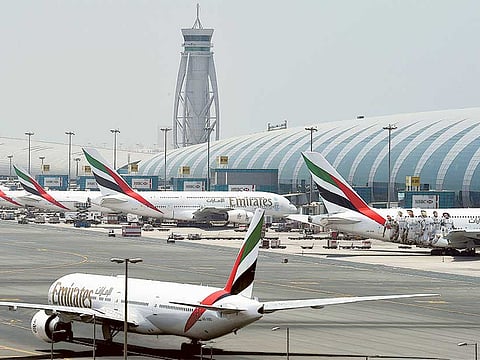Gulf carriers take a bumpy situation in their stride
Recent US diktats have been a strain on what are essentially critical routes

On March 25, the US forced 10 airports in the Middle East to implement an electronics laptop ban on three days’ notice.
While the airports met the tight deadline, the leaders of the two largest regional carriers are certainly not curling up into ball and hiding in a corner.
A month into the process, the President of Emirates airline and Chief Executive of Qatar Airways sat down for one-on-one interviews with CNNMoney in Dubai and Doha to share their thoughts on that decision and much more.
READ MORE:
It was, however, the blunt language aimed at the chief executive of United Airlines that captured most of the headlines after the forceful removal of a passenger on an overbooked flight.
“Let me say it was a disgrace. It shamed the airline industry as a whole,” Tim Clark told me at Emirates’ headquarters. “We don’t go about our business in that way. It’s symptomatic of a corporate culture within that company from the board and chief executive downwards.”
United’s CEO Oscar Munoz apologised on numerous occasions and took full responsibility for actions that quickly evolved into a public-relations nightmare and eroded $250 million from the company’s market capitalisation.
Munoz remains chief executive, but the board decided not to grant him the dual role as chairman.
Clark said he would have fallen on his sword if he was in charge at United.
“Had it been me in that position I would’ve have had blue flashing lights on cars going right through the company to find out how this could’ve been allowed to happen in the first place. That was probably the last thing I do before I resigned.”
At odds
The Gulf carriers have been at odds with major American airlines for years and this spilt out into the open again when Emirates decided to trim services to US cities because of all the policy changes from the Trump administration since the start of the year.
This would include the attempted travel bans that targeted this region, new visa requirements, a review of the so-called H1-B visa for specialised overseas workers and, of course, the laptop ban.
“It is what I call unintended consequences,” said Clark, “From the Emirates point of view, the policy of the federal government is outweighing anything else at the moment.”
Clark was referring to the impact of a high-profile global advertising campaign to attract visitors to the US and even local efforts from destinations like the City of Los Angeles.
For the CEO of Qatar Airways, the electronics ban took centre stage. He said it was poorly conceived and rushed into action, regardless of the security intelligence that was being gathered by the US agencies.
“In today’s day and age we have so much advancement in detection systems that we should utilise them and not just shoot from the hip,” Akbar Al Baker told me during a global gathering of airport chief executives in the Qatari capital. The outspoken CEO was an early backer of Donald Trump so he was careful with his criticism of the President’s first 100 days in office.
“I am always a supporter of Donald Trump but a president you know will act upon the advice of people that are around him. And I think on this matter he was ill advised,” To drive home his point he injected a bit of humour into our interview, “If [Trump] continues this way, at the end of the day you will have people sitting in the aeroplane with underwear and nothing [else] on them.”
Battle over access
But the battle over access to the US market is no laughing matter. Both sides have been trading verbal barbs for the last three years and have put forward thousands of pages of evidence to defend their positions.
Many airline strategists believe it will be difficult to curtail the expansion of the Gulf carriers due to the size of their fleets and orders of Boeing jets and component parts made by giants such as GE and Pratt & Whitney.
“We are today living in a globalised world and you really cannot close your doors,” said Al Baker. “Trump is not a nationalist, Trump is a pragmatist. He is looking after America first and we are supporting him in America first.”
But this has not stopped the lobbying group for the American carriers called “Open & Fair Skies” to seize upon the opportunity of Emirates’ decision to trim flights to the US saying that “market demand has never played a role when the Gulf carriers decide where to fly.”
Clark was not surprised by that language and struck a similar tone in his reply.
“I am sure they are delighted, but be careful because we will be back. And we will continue to grow our product and presence in the US throughout the cities we are already serving and others to come.”
The writer is Editor of CNNMoney.



